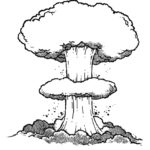Donald Trump likes to say he’s the “greatest.”
This is what Swiss analytical psychologist Adolf Guggenbuhl-Craig had to say about “great” men 20 years ago. It is more true, and more chilling, than ever.
“Contrary to popular belief, there are certain advantages to being a psychopath or compensated psychopath. Many of them have a relatively easy time adapting to society, unencumbered as they are by moral or neurotic scruples. They replace the lack of love or of true relationship with a love of power, something they can achieve without too much difficulty owing to the absence of moral or Eros-related restraints…
It is little wonder that psychopaths occupy so many of the top positions in society and rather astonishing that there are not more in such positions. Let me put it somewhat differently. One of the major problems of any society, of any political or large organization in general, is that of preventing unscrupulous, socially adapted psychopaths from gradually taking over the helm.
There are many countries in which the problem is a long way from being solved. There are even certain countries whose political organization encourages psychopaths to rise to positions of power, where only psychopaths can achieve such positions. It is not difficult to imagine in what spirit such nations are ruled. Nazi Germany is good example.
All dictorial forms of government, be they left-wing or right-wing regimes, are certainly to some extent dominated by psychopaths. Stalin was probably a psychopath, with a pronounced shadow and a decided power drive. Trotsky, originally his friend, was more of an idealist, but observe: Stalin died of natural causes at a ripe old age; Trotsky was murdered. There seems to be some truth to the expression, “the good die young.”
One is inclined to ask how, in a democratic country, we may prevent psychopaths from inveigling their way to the top. The power of the highest administrative positions is so strictly curtailed in Switzerland, for example, that it hardly tempts psychopaths. It seems to me even more important that the people be able to see through a psychopath, to see through their own psychopathic side. In most democracies, this ability is well enough developed so that a dangerous psychopath is usually detected when he appears on the scene.
I am convinced that a democracy whose citizens are incapable of discerning a psychopath will be destroyed by power-hungry demagogues. In Switzerland the resistance towards “great men” and the preference for mediocre political figures would seem to result from an instinctual desire to prevent psychopaths from coming to power.
Although there is certainly such a thing as a “great man,” many such figures are probably nothing more than unrecognized psychopaths. Think of personages such as Alexander the Great, Genghis Khan, Napoleon, William II of Germany and many, many other more or less esteemed leaders of the past and present. These “great” criminals–and one must include Hitler and Stalin among them–destroyed the lives of millions. Themselves “erotically” stunted, they succeeded in obtaining recognition and power over societies in which they, themselves, felt shut out, power which was necessary to maintain the illusion that they actually belonged.
Happy the nation which gives such “great” men (and women) short shrift.”
Excerpted from Eros on Crutches, in Meeting the Shadow, edited by Connie Zweig and Jeremiah Abrams. [Bold type of certain phrases added.]


